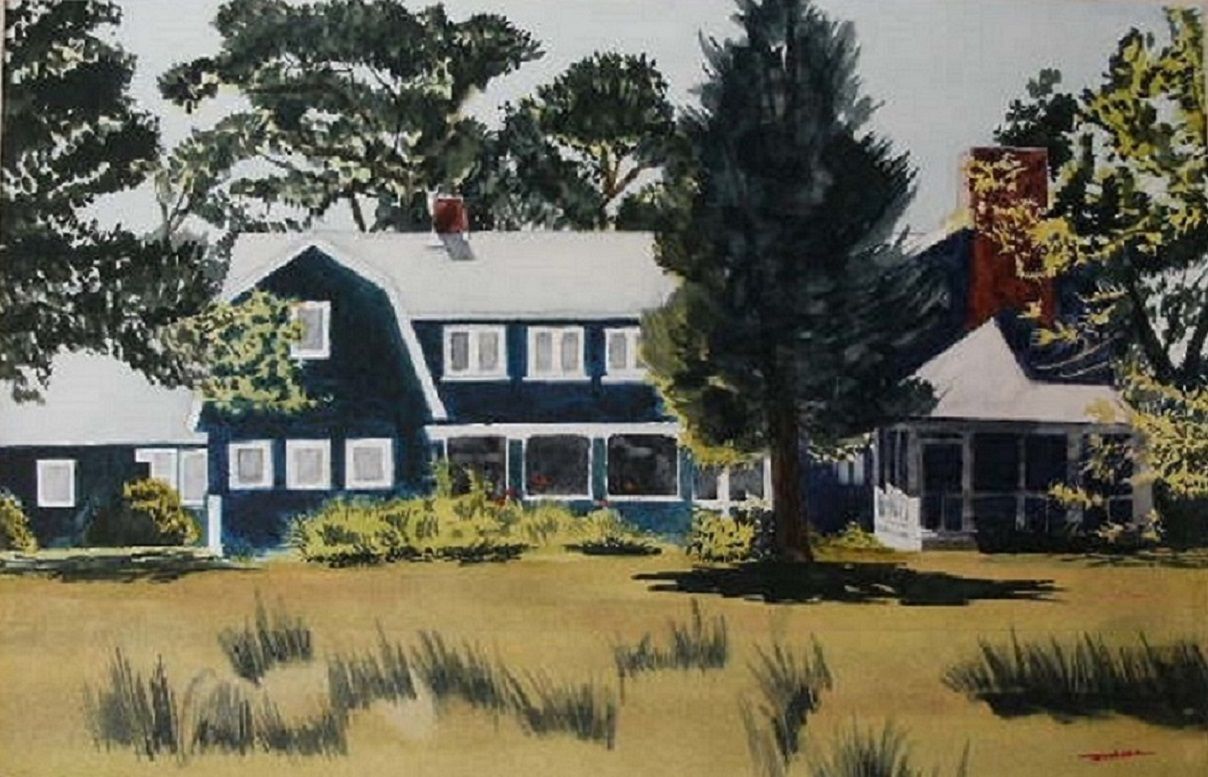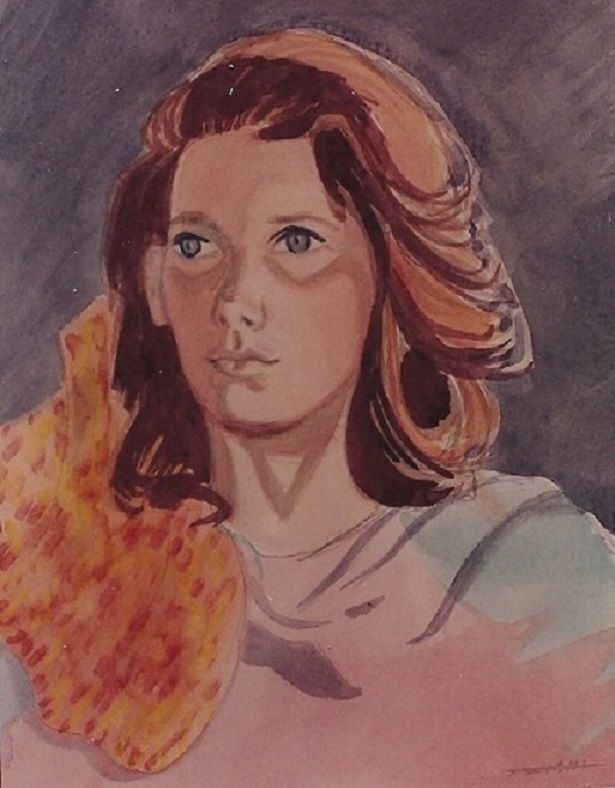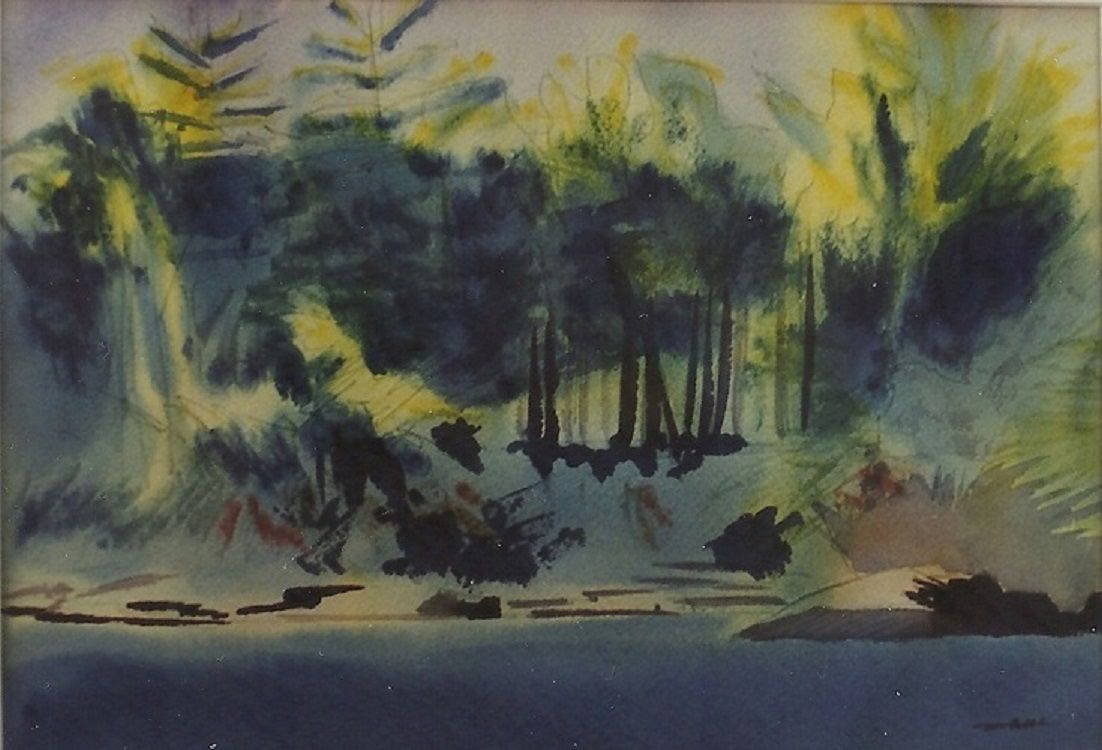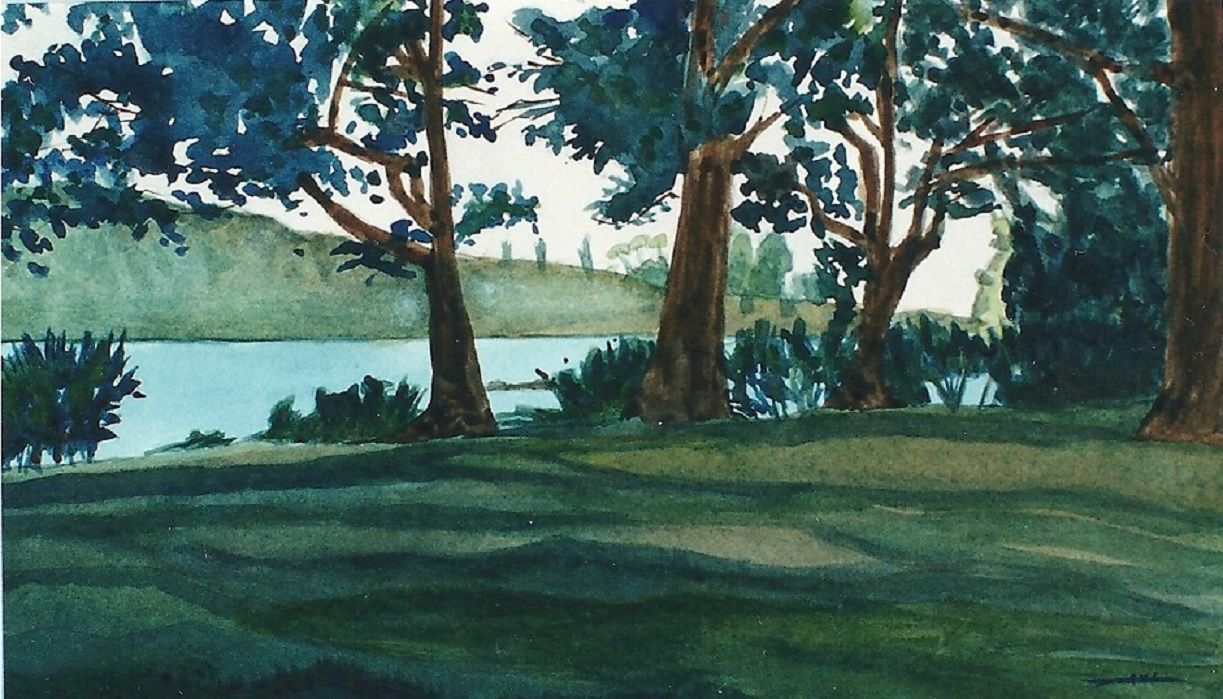My happy acquaintance with Wild Goose Island in the St. Lawrence River, and the family of Cleveland “Clee” Dodge, Jr. that own it, was an outgrowth of the fact that Clee’s daughter, Alice, was one of the best friends of the lady I was courting in London in the 1980s. Alice Dodge married an Englishman, Robin Berkeley (mispronounced “Barkley” by the English), an executive with British Petroleum. Alice and my lady friend served together on the board of a charity called Fitzroy Homes, which provided housing for orphaned children, and its Royal Patroness was Diana Princess of Wales, but aside from that, my lady friend, Linda, and the Berkeleys socialized extensively anyway, so I got to know Alice and Robin, and then the Dodges, quite well.
One of my earliest meetings with Alice Dodge Berkeley resulted in my making what could be considered a terrible faux pas. Alice told Linda and me that when she first moved to London from the U.S., before she met and married Robin, she had what the English call a “walker,” a gentleman escort who serves quietly to accompany ladies to parties, without, necessarily, any further connection, just a sort of “Please escort” situation. Alice said that this walker escorted her regularly for some time until he asked her whether she was related to the American family that made Dodge automobiles, and Alice told him no, whereupon, said Alice, “I never saw him again.” At this, I burst out laughing and told Alice, for a joke, because I had no idea it was true, “You should have told him you were a member of the Phelps-Dodge copper-mining family.” Ever-so-modest, Alice didn’t say anything, but I learned later that, well, yes she was(!), which floored me, as I had not dreamed of the coincidence. One of my many howlers.
Alice’s mother, Phyllis, wrote a book, Tales of the Phelps-Dodge Family, chronicling the history of the family, a charming revelation of the modest beginnings of this deeply religious and highly industrious family that progressed from the inconspicuous manufacture of ginghams and calicoes to copper- and molybdenum-mining in the U.S. West, making it one of America’s greatest industrial giants.
Besides heavily endowing Princeton University, subsidizing the American University of Beirut in Lebanon, and engaging in a multitude of other philanthropies, Clee Dodge’s father, Cleveland Dodge, Sr., was a massive contributor to Woodrow Wilson’s political campaigns that made him U.S. President for two terms. There is a photo in Phyllis’s book, of old Cleveland Dodge striding down Fifth Avenue in New York beside Woodrow Wilson.
When I spent time with the Dodges in the Thousand Islands, they had not lost that religious commitment, for, every Sunday morning without fail, Clee Dodge organized a religious prayer service in the big house on Wild Goose Island, in which Clee delivered a thoughtful sermon. Then we would have lunch and play tennis on the family tennis court.
My most outstanding memory of Phyllis Dodge is connected with an outing in London in about 1988 that was a Fitzroy Homes charity event. It was a black-tie occasion held in the Grand Ballroom of Claridge’s Hotel, and Princess Diana even attended it. Phyllis and Clee had come over to London to visit Alice and Robin and their children, and the six of us, Clee, Phyllis, Alice, Robin, Linda and I, went to the ball together. I was wearing over my tuxedo a black cape that had a velvet collar, a white silk lining, and a frogged clasp below the throat, exactly the same kind of cape worn by President F.D. Roosevelt at the 1945 Yalta Conference with Stalin and Churchill during WWII. I know, because I had shown a photo of it to the tailor, I hired to make the cape for me.
Well, Phyllis Dodge took one look at that cape and pronounced authoritatively,
“That, Joe, is what is called a ‘boat cape,’ ” which was news to me, but I could tell that Phyllis knew exactly what she was talking about, for Roosevelt, before he became President, had been Assistant Secretary of the U.S. Navy, so it figured that he would wear a boat cape, and here he is in it—if you look carefully at the bottom of the picture, you can see, just left of center, the frogging of the clasp:

Linda and I visited the Dodges in the Thousand Islands twice, in the late summers of 1988 and 1989. The first time, Linda rented the Churchill House (no connection with Sir Winston) on Grindstone Island for her, her children and me, but our entire social life was with the Dodges on Wild Goose Island, to which we went by skiff with an outboard motor. The second time, we stayed with the Dodges on Wild Goose, living in the guest house. I became somewhat less than an expert navigator of the St. Lawrence. My local geography was rather lame at that point, and I expressed my concern that we might get swept over Niagara Falls, but Clee allayed my fears by informing me that the Falls are upriver from the Islands. Whew!

The Dodges’ sleek speed hull the Wild Goose, known as a “commuter” in the boat trade, was not the only boat the Dodges had. They kept many boats in a huge, barn-like boathouse that was bigger than most people’s large mansions. The boatkeeper was an old fellow named Les, with whom I enjoyed talking about his old-time memories of Clee Dodge’s father, who had hired Les when he was a boy.
I have had a very bad habit all my life of drawing and painting very amateur pictures and watercolors everywhere I go, and while in the Thousand Islands, I panted the attached watercolors, Hickory Island Seen from Wild Goose Island, The Churchill House on Grindstone Island, Grindstone Island Seen from the St. Lawrence, and Linda’s Daughter Alice von Stauffenberg on the Porch of Churchill House.

One morning while staying at the Churchill House, I was surprised to hear the lowing of cattle outside, and I looked out the window to see a herd of cows resolutely migrating across the lawn! Where they came from and went on Grindstone Island, I have no idea.
The Churchill House had a large collection of books in its library, and I became very fascinated with one I was reading while there, but I hadn’t finished it when I left, so I took it home with me, and when I finished it, I mailed it to the real-estate agent in Clayton, N.Y. who had rented the house to Linda and asked the agent to replace it in the Churchill House library, which was done. It was a clever historical mystery novel that dealt with the indications of a Viking discovery of the North American continent almost 500 years before Columbus showed up.
I was immensely fond of Alice Dodge Berkeley and her mother Phyllis Dodge. Alice had ice-blue eyes, an adorably cherubic, smiling face and a benign, kind disposition that was very endearing, and Phyllis had an authentic old-fashioned ladylike stature, yet coupled with easy and welcoming accessibility. Alice and Robin had two children, Julia (“Juby”) and her little brother, Hugo. When I knew them, Hugo was eight or nine. I was also very fond of Hugo, and one day I asked him, “Whom do you think you take after more, your mother or your father?”, and I love his answer to this day. Airily dismissing the two choices I had given him, little Hugo said, “Oh, neither of them. I take after my grandmother, Phyllis Dodge.” I told Hugo, “You could not possibly have made a better choice.”

Alice’s husband Robin, who had been a Cambridge “Blue” (whatever that means, but I think it has something to do with athletics) was a very keen tennis player, as was I, and he invited me to play tennis with him at the Hurlingham Club in London when I was there. I used to make regular visits to Lew Hoad’s Tennis Club in Spain, and one time, in 1990, I rented a house near Hoad’s club for Linda and me and invited Robin and Alice to bring their children and come stay with us there, little thinking that they actually would. Lew Hoad was the legendary Australian tennis player who had won the Australian, French, and Wimbledon Championships in the 1950s; he and his wife Jenny had retired to the Costa del Sol in Spain and opened a tennis resort there, which was a big favorite with vacationing English, German, Scandinavian, and other internationals.
While Linda and I were staying in the house I rented there, we took a driving trip to Granada to see the Alhambra, and when we returned to the house a few days later, there was a car parked in front of it. Having forgotten the invitation to Robin and Alice, we were mystified as to whose car it could be, but when we opened the door of the house, there, to our surprise and delight, were Alice, Robin and their children. They stayed with us for about a week, and we had a marvelous time with them. They had gotten the key to the house from the people at the club while we were away.
One day during that Spanish sojourn, I sat on the Hoad’s Club terrace painting a watercolor of people playing tennis on one of the courts, while Alice and Robin’s son Hugo was sitting next to me. Some watercolors I paint take weeks, but I prefer the ones I can do in just one sitting, as they have a more spontaneous impact. This one, A Suburb of Paradise, The No. 2 Court at Lew Hoad’s Club, was of the latter type, as I painted it all in less than an hour. Little Hugo was greatly impressed with how I did it and expressed the utmost curiosity about it, asking me many questions that I answered, and I can’t look at that picture now without thinking of little Hugo sitting next to me and admiring it while I was painting it. I understand that when Hugo grew up, he became a reporter for Reuters in Italy, married, had children, and may now be living back in the U.S. with his wife and family.
Robin was transferred by BP from London to Portugal, then to Belgium, and then retired and is back in London, where he and Alice live in a house in Tite Street, Chelsea, a street famed as the former residence of the artists Sargent and Whistler, and the writer Oscar Wilde.

My last contact with the Dodges came at some time in the later 1990s when Clee Dodge phoned me in New Orleans, where I was still practicing law. Alice had told me that Clee was an inveterate inventor who was constantly designing mechanical devices that were sometimes successful but mostly not. One of these was a book-binding machine that would enable anyone to publish the finished product of a book, all bound and put together in hard covers, which interested me, as I am constitutionally afflicted with a galloping species of logorrhea that has me constantly writing, but that invention by Clee never got off the ground, as far as I know, although I think I may have heard of the existence of such a machine.
Well, when Clee phoned me, he said he was looking for a lawyer to draft a contract for him; he said he’d invented a machine that could be submerged to clean the barnacles off the hull of a ship without dry-docking the vessel or sending divers underwater to do the job—a tremendous labor-saving device—that he’d found a fabricator in Mobile, Ala. to build the machine for him, and that he wanted a contract drawn up between himself and the fabricator to regulate their obligations and specify other details like the scheduling of the work, cost of the job, etc.
I told Clee that was way out of my ken, as I was an exclusive specialist in maritime death and injury litigation and I only represented people injured and families of people killed on cargo ships, offshore oil rigs, crew boats, supply boats—any maritime casualty involving life or limb over navigable waters. So I told Clee I would check with my opposite numbers of the maritime-insurance defense bar (who loved me because I was always suing their clients, and they were constantly encouraging me to keep doing so, as in “Thank you, Joe, for suing our clients, please sue them again”) to see who might best fulfill Clee’s need. I did, and I gave Clee the name of a lawyer who’d been recommended to me by my pals of the defense bar whom I supported for years by suing their clients. I don’t know what became of the barnacle-cleaning machine, as that was the last I heard from any of the Dodges.

Those are my memories of the Islands and the Dodges, and I must say, in concluding, that knowing those fine and wonderful people, and the Islands in the beautiful St. Lawrence River, has been one of the happiest and most rewarding associations of my life, which I harbor with pride.
By Joseph B. Stahl
Joseph B. “Joe” Stahl, born 1936 in New Orleans, is a retired maritime-death-and-injury lawyer, but as he puts it, “I masqueraded as an attorney at law over a period of about 40 years until I retired in 2004.” His real interests lay in making pictures; in ancient and modern languages and literature and telling stories; in playing, writing, and broadcasting about tennis; and in travel and living abroad.
Posted in: Volume 17, Issue 9, September 2022, History
Please click here if you are unable to post your comment.
